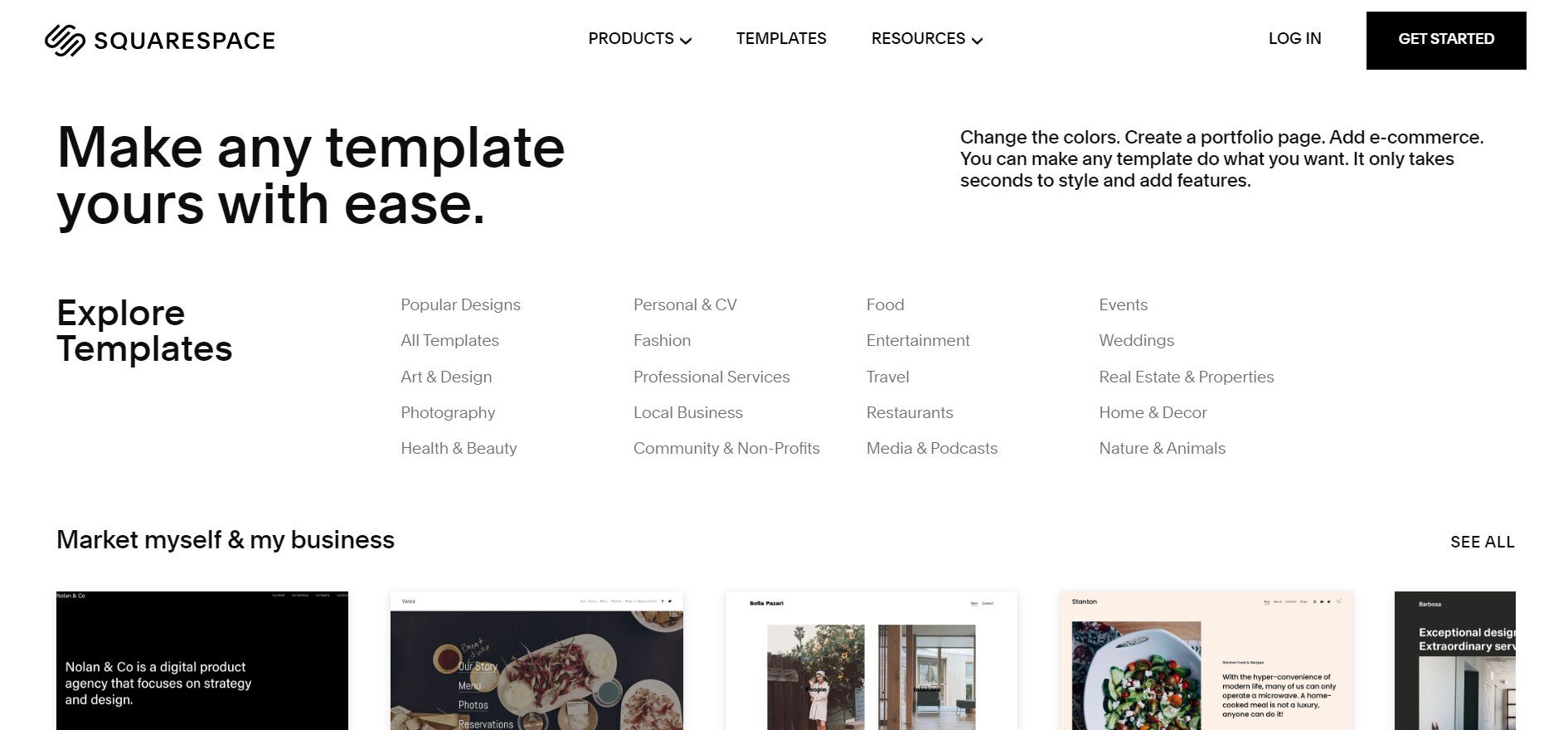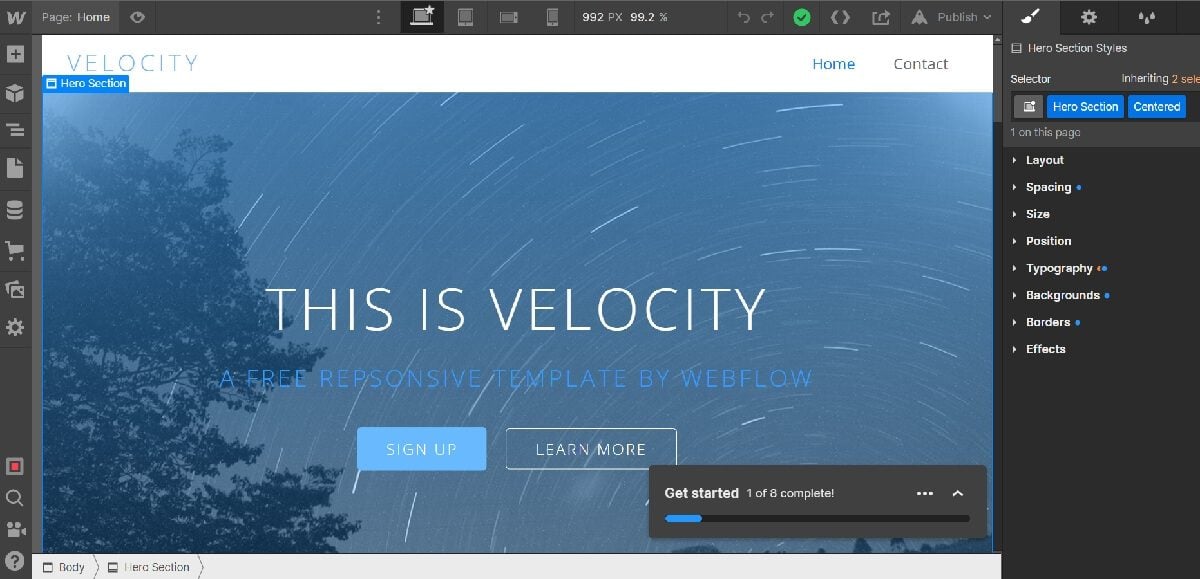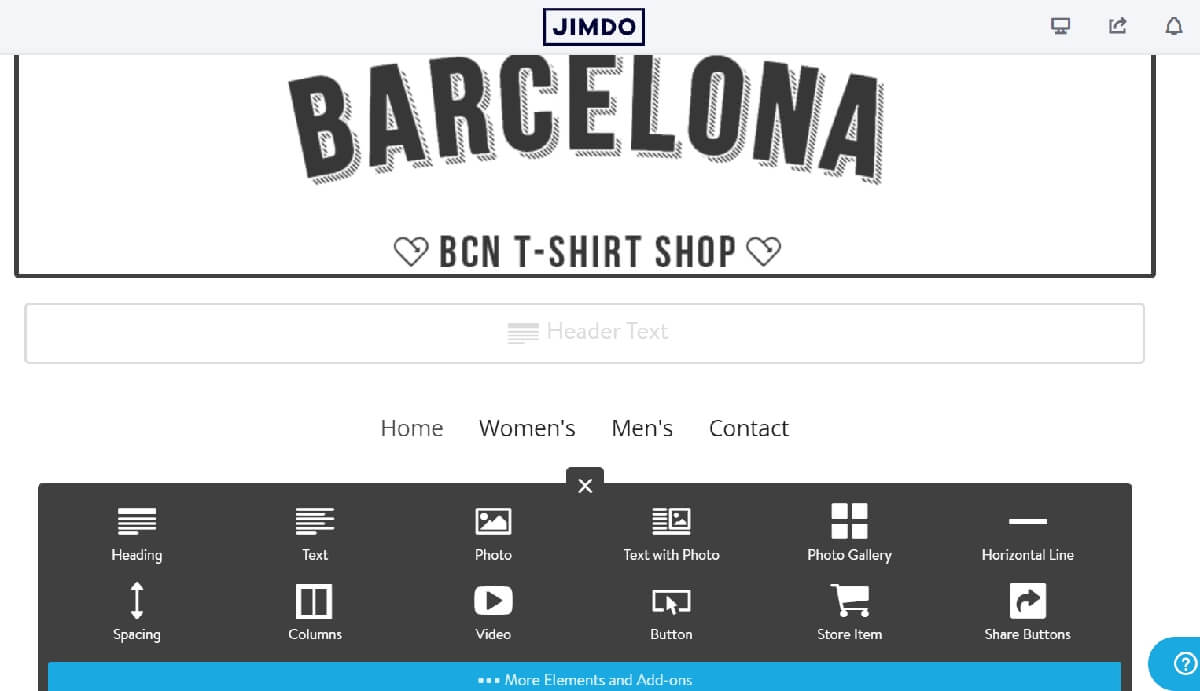Looking for the best alternatives to Shopify is a great way to make the right decision that affects your business. Shopify is a solid website builder for online stores, but it has flaws that can be unbearable on some occasions. These pitfalls in its services make it a less desirable website creator.
To help you find the service that best suits your needs, we’ve taken the time to test and compare a large number of alternatives to Shopify. We’ve listed them below.
5 best alternatives to Shopify in 2025:
- Wix
- Hostinger Website Builder
- Squarespace
- Webflow
- Jimdo
Reasons to Consider Alternatives to Shopify
If you are already a Shopify user, these are some of the setbacks that you should make you consider an alternative website builder. However, you can avoid them if you are yet to invest time and money in its services.
No Free Plan and a Very Limited Trial Period
Unlike many website builders, Shopify does not have a free plan to allow you to test its services before committing to a premium plan.
Although it has a 3-day trial for new users, it is not enough in our opinion. Trying out a new site builder and getting familiar with it takes longer than that, and Shopify should have considered that.
Many website builders offer unlimited trials or free plans to try out until you are satisfied or sure. It gives you more time to process your decision to invest in them. Since they come with free subdomains that you can keep forever, you can kick-start your business with this.
Therefore, Shopify alternatives with free plans, a branded subdomain or a longer trial window are more advisable.
Limited SEO Access & Customizations
Shopify has a fair SEO setup built-in into its account and store management dashboard. You can set your SEO titles for products and blog posts, meta descriptions, alt texts for images, and alter the URL of posts or products. You cannot, however, alter the URL structure of your product pages.
At the same time, you do not have easy control over your site’s robots.txt file. The site builder automatically creates a default robots.txt file for you with some rules you may not need. But it does not make provisions for an intuitive method of editing the file. Thus you may need to hire a Shopify expert to do it unless you want to mess up your site’s SEO.
The sitemap is also automatically created by Shopify, and you have no control over it. The only thing you can do to decrease the control of the sitemap over the indexing of your site is to customize your robots.txt file. You can ensure that some directories or pages in the sitemap you don’t want to be indexed are not crawled at all.
There are no advanced features or controls you can use to improve your site’s SEO, so it is too limiting. If this is something important to you, opting for the best Shopify alternative presented next is recommended.
Expensive Plans with Upsells
Another reason to consider alternatives to Shopify is that it is quite an expensive eCommerce site builder. The site builder’s lowest package, Starter costs only $5 monthly. But it only allows you to sell across social media platforms.
To upgrade from this, you have to get the $29 per month Basic package. This plan allows you to have only 2 staff accounts for your online store, and you have to pay an additional fee if you have more or purchase a higher plan.
Furthermore, it has a limited pool of templates, which are hard to customize due to its custom “liquid” markup language. Out of the ones available, the really useful ones that are appealing with great features are paid for. As a result, despite the huge subscription fees, you have to pay over $200 for a theme to have a decent-looking template to customize.
Targeted at Store Owners Only
Even though Shopify has provisions for blog posts in its site editor, it is not aimed at bloggers. It is more like an eCommerce website builder than a normal site creator.
So if you aim to build a site with no eCommerce functions, any Shopify plan is overkill. You should consider alternatives with cheaper plans specifically for normal sites instead.
Limited Product Variations
The last reason to consider an alternative to Shopify is that even though you can upload an unlimited number of products for sale, the variations you can sell are limited.
It limits the combination of variations you can sell to 100 per product. Thus if you have a lot of variations of a product to sell, you will be forced to let go of some of them if the combination is more than 100.
The Best Shopify Alternatives to Consider in 2025
These are some website builders that are better options when compared with Shopify. Discover below a presentation for each member of our ranking.
1. Wix
Wix is one of the most popular site builders and the best alternative to Shopify in 2025. Its popularity can be credited to all the amazing features it has packed in its tools.

Wix is a drag-and-drop site builder which is intuitive to use as it takes new users or beginners only a few minutes to get used to. The builder interface is quite appealing, and the arrangement of the controls makes it super easy to use. You can create a masterpiece with the website builder in just a few clicks.
Wix has many free website templates that mimic real sites, and you can easily customize them to your taste. These templates give you a headstart during your designs and save time you could have spent thinking of a new site layout.
When it comes to eCommerce, Wix is king! This website builder has countless numbers of features for online stores. They include abandoned cart recovery, membership or subscription-based services, multiple currency support, and automated tax calculation.
The ability to sell your products through social media and popular marketplaces like eBay, integration of product review features, and loyalty program support are other amazing features Wix has.
These are only a few features that make Wix the best Shopify alternative you can find.
Why You Should Choose Wix as Your Shopify Alternative
Here are a few reasons you should consider choosing Wix over Shopify:
Has Provisions for Building Normal Blogs
Unlike Shopify, Wix has provisions for clients interested in building simple sites.
Its plans are divided into two sections which are “Website” and “Business and Commerce”. The plans under the Website category only have enough features to build and host a normal site. But they are better than Shopify because the blogging features go beyond only the ability to write and publish blog posts.
You can purchase one of the Website plans and build a blog with no limits. If you ever wish to add an online store to your site or accept payments, you merely need to upgrade to your desired eCommerce plan. You will still have all the Website features in addition to the eCommerce features of the plan you purchased.
More Built-in eCommerce Features
Wix has more eCommerce essential features than Shopify. It has a loyalty program feature that you can use to build stronger relationships with your customers.
Furthermore, its online booking features are superb. The feature, which is not on Shopify, allows you to take online bookings for classes, appointments, and courses and manage every schedule in a single dashboard. If you have staff members, there is a provision to sync your calendars so that everyone is always updated.
Moreover, you can provide free trials to customers, give them discounts, and let them pay for your services through the Wix Owner app to give them a better experience.
In addition, Wix has specific features just for eCommerce stores for hotels, restaurants, fitness coaches, event planners, and artists.
These are only a few eCommerce features you can find on Wix that are superior. Thus, it is a better alternative because Shopify eCommerce features are no match for them.
Better and Advanced SEO Customization
Another reason to consider Wix the more reasonable option is that its SEO approach is better and more practical.
It has a more advanced and rather effective SEO dashboard. For starters, you have control over your robots.txt file. Since it follows the common pattern and you can see guides to editing it online, you don’t have to pay an expert for the job.
The SEO setup or checklist covers local and social SEO settings. You will get to specify up to 5 keywords that you want your homepage to rank for on search engines.
At the same time, the product pages do not only allow you to customize SEO titles, meta descriptions, and URLs. You can also customize your social share SEO settings, change your schema markup for a better understanding of your pages by search engines, and specify custom robots meta tags for each page. This works in the blog posts and the product page editors.
In practice, a Wix website will perform better in SEO than a site created with Shopify.
Longer Trial With Free Plans and Freebies
Unlike Shopify, with only a 3-day trial, Wix offers an unlimited trial period that gives you more time to test its free features.. There is also a 14-day money-back guarantee for paid plans.
The only restrictions with the free plan are that you cannot add a custom domain, some features like storage space are extremely limited, and you cannot accept payments.
Furthermore, Wix gives you freebies, like a free domain registration for the first year, and you have a logo maker to create free professional logos for your site.
Better Customizations With More Templates
Another reason why Wix is a great alternative to Shopify is because it offers more advanced customizations. This means you can add more features to your site and customize every little detail to achieve a fully functional website. Despite this advancement, customizing sites with Wix Site Builder is extremely easy. With Wix Artificial Design Intelligence (ADI) that can design your site for you in seconds, you can sit back and let the magic unfold.
In addition, Wix has several free website templates that customers can use to kick-start their designs, leading to faster site setup. For all these reasons, Wix is an alternative to Shopify that is worth testing.
2. Hostinger Website Builder (formerly Zyro)
Hostinger Website Builder, formerly known as Zyro, is another great alternative to Shopify. The site builder is the most affordable option, with many features for customers to enjoy.

Hostinger Website Builder is a drag-and-drop editor with a very intuitive interface. It requires no coding knowledge or design skills, thanks to the availability of many site templates and the ease of use of its editor.
Moreover, it integrates with many third-party applications to give your site more features that enable smoother running. You can read our Hostinger Website Builder review for more details.
Reasons Why Hostinger Website Builder is a Better Shopify Alternative
Here are some ways this site creator is better:
More Affordable & Better Value for Money
Hostinger Website Builder is more affordable than Shopify in obvious ways. For Shopify, the least expensive useful package, Basic, costs about $29 per month, and it has several restrictions that you have to upgrade to a higher tier plan to access.
On the other hand, Hostinger’s offer costs a little less than $3 per month. This package has all the eCommerce features Hostinger offers with no restrictions or hidden charges.
Freebies and AI Tools
Another reason the Hostinger website creator is better than Shopify is its many freebies customers can enjoy. One of these is a free domain for the first year of your purchase.
The site builder has many AI tools that help customers achieve a variety of stuff as well. The AI logo maker is one of the most valuable tools as it provides easy ways to make a professional logo for your business in different formats or sizes. Other free tools include AI Writer, AI Heatmap, etc.
In addition to that, you will be able to create and manage up to 100 email addresses (of 1 GB each) at no extra cost.
More Beginner-Friendly
One additional reason Hostinger Website Builder is a good alternative to Shopify is that it is easier to use for beginners. The interface of the site creator is a lot cleaner, with a less confusing setup to get the job done.
At the same time, more free and globally available website templates are provided so you can have a better and more enjoyable editing process.
Managing your blog and online store is equally straightforward since they have special intuitive control sections with every tool you need available.
3. Squarespace
Squarespace is a sophisticated and amazing Shopify alternative for building an eCommerce website or “normal” site.

It is a WYSIWYG (What You See Is What You Get) or visual editor that you can use to create powerful websites. Squarespace works on the drag-and-drop model as well with a beginner-friendly editor. It has many free website templates you can use as starting points for your designs.
The website creator has many eCommerce features, including dropshipping, product reviews, advanced shipping, abandoned cart recovery, unlimited products, etc. With its support for many free eCommerce third-party apps integration, there is no limit to the features or customization you can add to your online store.
It has a great blogging system as well. You can set SEO titles, meta descriptions, featured images, and social settings for new blog posts or pages. At the same time, you can add HTML tags to each page. Here is a comprehensive review of Squarespace website builder.
How Squarespace is a Better Alternative to Shopify
Here are some of the reasons why we think Squarespace is a solid alternative to Shopify.
More Customizations
Squarespace is generally more advanced than Shopify when it comes to customization.
The website builder has more free templates for customers to play around with. This gives you more design ideas you can use for your site. At the same time, Squarespace supports many free third-party integrations so you don’t end up paying too much for apps as you would with Shopify for advanced features.
Moreover, it supports CSS and JSS customizations. Unlike Shopify’s “liquid” approach, CSS and JSS are more popular and easier to implement due to the availability of many educational materials. You can use it to add features to Squarespace that third-party integrations do not offer.
Another customization you can make is creating a custom checkout page for your online store. This checkout page contains only your domain name, so customers aren’t redirected to a third-party site. It is more professional than Shopify’s approach, where customers are redirected to your free Shopify subdomain during checkout.
Greater Affordability & Value for Money
More value for money is another reason why you should consider Squarespace as your Shopify alternative.
Squarespace is generally cheaper than Shopify. You can get a good plan for about $16 per month on Squarespace, whereas you need at least $29 per month to get a useful plan from Shopify. At the same time, you can get all the features the former has with a monthly subscription of $49, while the latter costs almost $300 per month.
Despite this, Squarespace still provides more value for the money. Unlike the other site builder, it gives you freebies like a video maker, promotional pop-ups & banner generator, 0% transaction fees on the Commerce plans, and free Google Workspace email hosting for a year.
Another important restriction you can avoid here, as opposed to at Shopify, is the limit on the number of contributor or staff accounts you can create. Instead of 15, you can create an unlimited number of accounts with Squarespace so that your team members do not need to share login credentials, making managing your site or store easier.
Best Free Alternatives to Shopify
Looking for a 100% free alternative to Shopify that allows you to create an online store? Here are two services to consider in 2025.
Webflow
Webflow is a great website builder which is very popular among web designers, freelancers, and agencies. It is a drag-and-drop site builder with many amazing features embedded in its editor.

Editing with Webflow is smooth and intuitive, thus making it very beginner-friendly for attentive prospects.
Webflow coding is so adaptive that it creates mobile responsive websites with a high probability of great SEO performance. You can decide to optimize the pages of your site for different screen sizes by editing them individually.
The website builder has a free plan that you can use without a time limit. You can design as many sites as you want at your pace and publish them to the Webflow.io subdomain. The best part about the free plan is that your credit card details or other payment information are not required.
Note: On the free Webflow plan, you are limited to only 50 CMS items, 1 GB of monthly bandwidth, and 50 form submissions lifetime. There is no provision to add your custom domain either. You can, however, upgrade with about $14 per month for better features.
To learn more, check our Webflow review.
Jimdo
Jimdo is also an interesting free alternative you can use in place of Shopify to create your site or store. It is a modern website builder with a very simple and modern approach to web design.
Jimdo works on the point-and-click model, which allows you to specify a particular area on your page where you want an element and click on the element to have it there. It does not require any dragging.
Furthermore, it uses an Artificial Design Intelligence (ADI) called Jimdo Dolphin. This AI automatically creates a befitting mobile-optimized website for you based on the information you give it about your business. It has a very powerful AI logo maker as well.

Jimdo’s blogging features are also great. You can create unlimited blog posts or web pages, set advanced SEO settings for fast indexing and performance, access your website analytics, and choose from a library of free high-quality photos.
The website builder has eCommerce features such as payment gateway integration, product variations, discounts, strikethrough prices, and social selling. Thus it is a great Shopify alternative for online stores.
Note: You can have as many free sites as possible on Jimdo, but many marketing and payment features won’t be available. You also cannot publish the site to a custom domain until you upgrade your plan to premium. Premium packages start from about $9 per month.
Conclusion: which alternative to Shopify should I choose?
Wix is a Shopify alternative that is better and matches the website builder’s strength in terms of features and ease of use. It is better for SEO, has more customization opportunities, and provides more eCommerce functionalities. The website builder is also a free alternative to Shopify with a lifetime offer which you can use after the trial period.
Hostinger Website Builder is also better than Shopify, and you should consider it as an alternative for better pricing flexibility and affordability. It is more beginner-friendly and has more free website templates to play with.